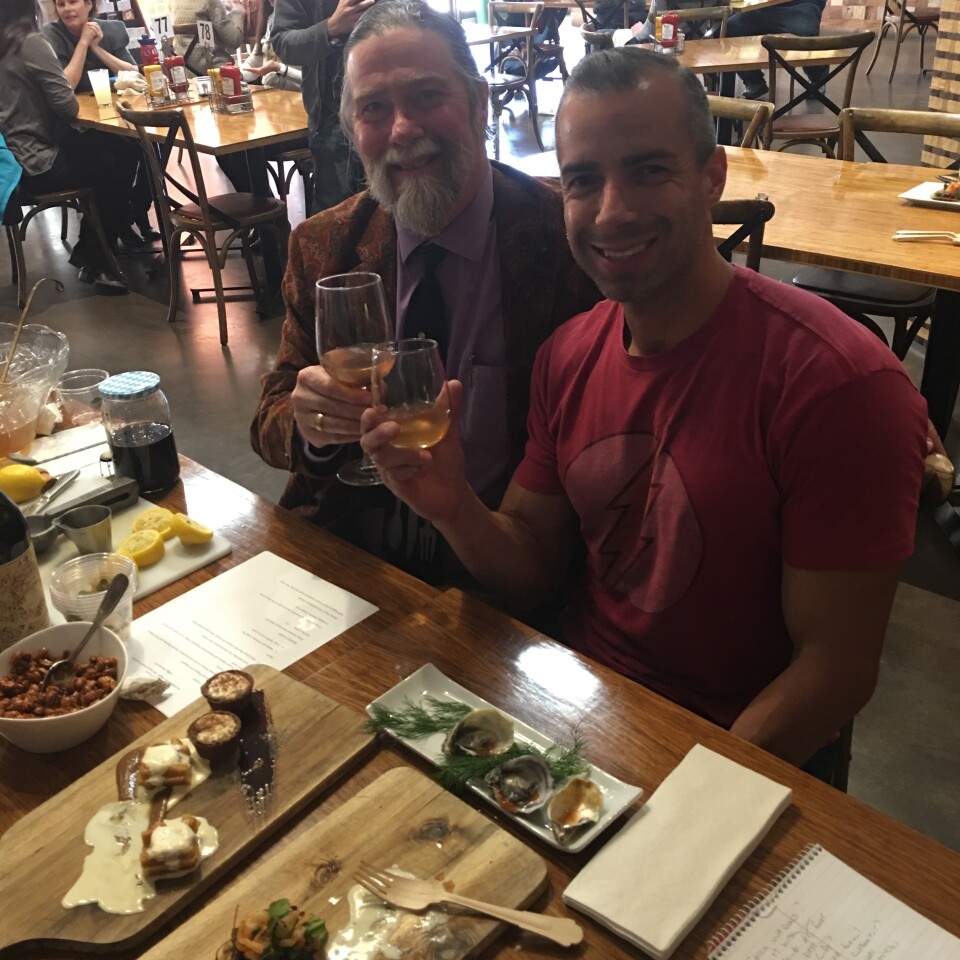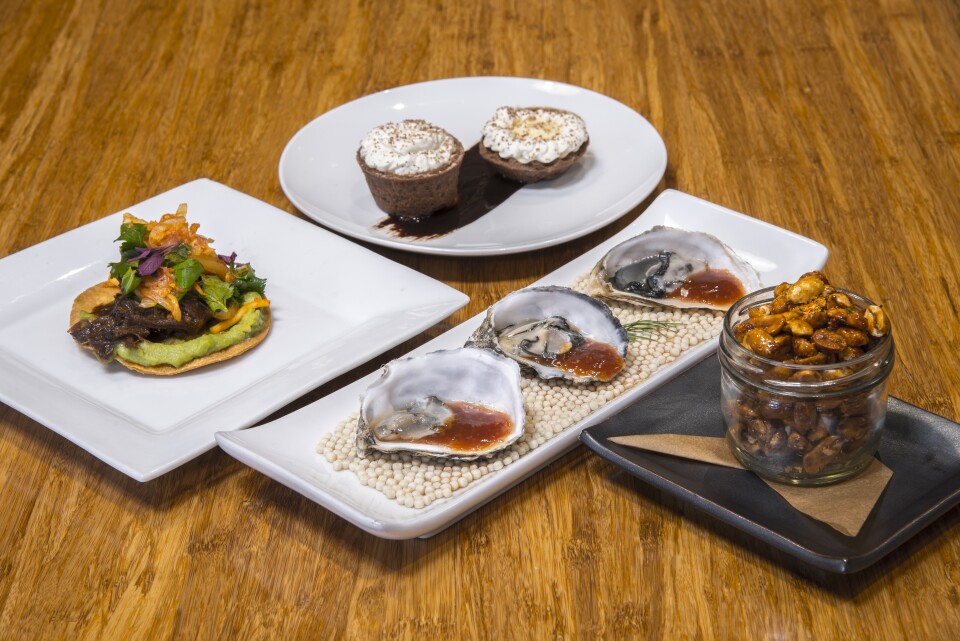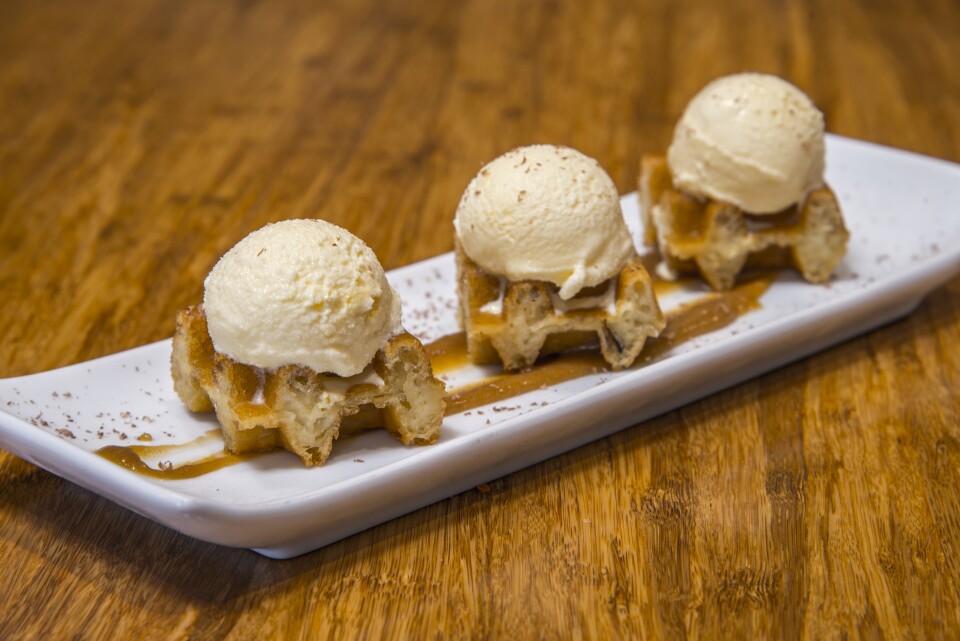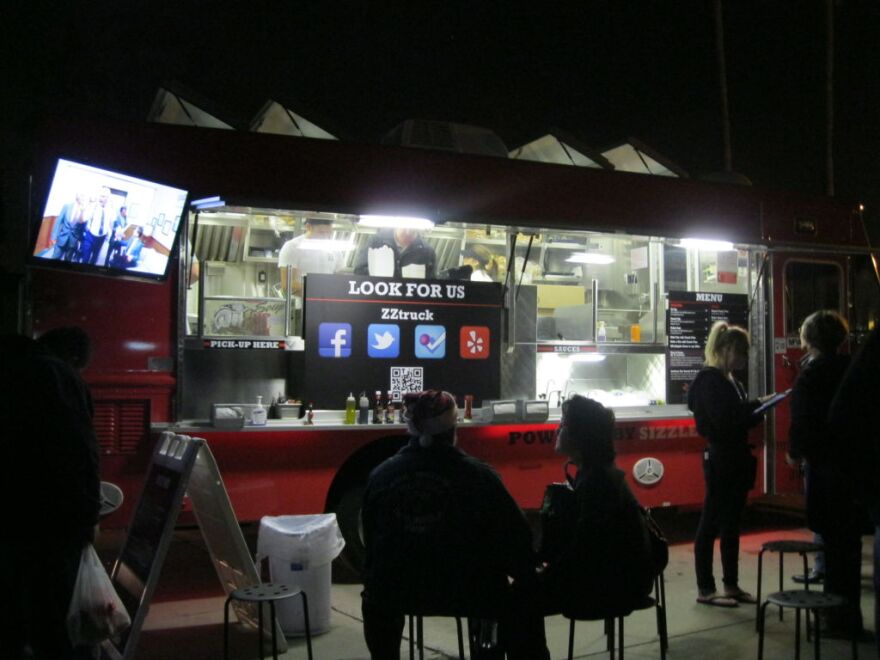Expanding past the radio dial and welcoming LAist to the KPCC family, a violinist's ties with the holocaust, the history of chuck wagons...the original food trucks.
California Dems converge on San Diego
Today, on State of Affairs:
- Investigation results are in, state Senator Tony Mendoza is out. Mendoza resigned Thursday after a two-month investigation into claims of sexual harassment.
- Democrats unite: California's majority party is throwing a party of its own in San Diego — and what happens in San Diego matters to the entire state.
Usually, candidates go to the convention hoping to glean endorsements from delegates, but Raphael Sonenshein, the executive director of the Pat Brown Institute for Public Affairs at CSU Los Angeles, says with so many candidates running, it could be difficult for them to measure success:
With the 60 percent threshold to get an endorsement, I think this is more of an audition for all of the candidates and a straw poll.
If you're getting in the 50s, for example, and there are not too many people close, you can declare a moral victory, even without the formal endorsement. But, really, you're testing out campaign themes with the core activist base that the party has relied on. There's a lot of new people there, a lot of new delegates who are coming for the first time. The party is wildly energized. So you've got an audience for your ideas and your ability to present them, so I think that may turn out to be more important than formal endorsements this time.
Guests:
- Scott Shafer, co-host of the KQED podcast Political Breakdown
- Raphe Sonnenschein. He's executive director of the Pat Brown Institute at Cal State LA
Classical music with holocaust ties comes to LA
Rare is the recital with so many layers. On Saturday, a musical trio from Poland will perform chamber melodies by some of the country's finest Jewish composers at the Los Angeles Museum of the Holocaust.
The connection between the composers and the Holocaust is not hard to discern. The men — Waghalter, Weinberg, Gelbrun, and Fitelberg — all fled Nazi tyranny. Several lost family members.
In this way, the masters share a common bond with the young performers tasked with interpreting their works Saturday.
"I have to mention the concentration camp in north Poland, which was called Stuthoff," began lead violinist Maria Sławek. "That's the place where my great-grandfather was killed."
Sławek says the fate of her great-grandfather remained a painful subject in her family.
Sławek, who dug deeper into her Jewish heritage as a teenager, says that when she plays music by Polish, Jewish composers, she feels a spiritual connection with the past.
She spoke with Take Two's Austin Cross.
Austin: The timing of this concert is a bit coincidental. Earlier this month, the president of your country, Andrzej Duda, signed off on a controversial bill regarding the holocaust, making it illegal to say Poland was complicit in Nazi crimes. It’s punishable by jail time. Can you share your thoughts with me on that?
Maria: Yes, although that's a very tricky question.
Austin: Tricky?
Maria: Tricky, yes. First of all, I have to say that as a Polish woman I'm very much ashamed of what happened. Considering my situation and my own Polish, Jewish cultural background, it's terrifying.
It's obviously not black and white, and it's difficult for me to find the proper words in Polish because in this situation every word counts. I mean, you can say something, and you can't take it back.
Second, I thought that in Poland somehow that the antisemitism vanished; I have to say that it hasn't. We have to discuss those who collaborated, those who didn't help, those who acted like nothing was going on. We don't need to fight; we need to say what we did wrong, what we did right and maybe open a new chapter because what happened now is disgusting.
Austin: Even in America, it’s hard for people to come to terms with the roles that their ancestors might have played in our history. What do you want people who see the performance to take away from your performance Saturday?
Maria: I don't want to sound — how do you say — cheesy —
Austin: Yes, cheesy is the word.
Maria: — that music connects people and so on, but it does.
We don't use words, we just use notes and impressions, emotions. The program that we chose, we chose it way back. We didn't predict that something like that would happen, but I think it's a nice coincidence that we have many different stories behind the composers.
We have different stories behind my biography and my friends' biography. We have different pieces: some of them are more connected to the Jewish heritage, some of the less, some of them feel like Polish folk music, but that's exactly what I want to achieve.
I want to have the proper connection between those two nations that used to live very much close to each other, not always as friends. True to music, you don't always have to be very precise about that. You give emotions, and that's what I want to do.
(Answers have been edited for clarity and brevity.)
LA's food trucks have been around for more than a century — and they've always been run by immigrants
It's been a decade since the Kogi truck hit the streets of Los Angeles, selling Korean-inspired tacos and sparking a trend that would change L.A.'s fast food landscape. But the history of the mobile food vending goes back much further — to the gold rush and chuckwagons.
"A chuckwagon and food truck are both different ways of serving large amounts of food to hungry people, under rather unusual circumstances," says culinary historian Richard Foss, "It's a way of taking food around, making it accessible and it's extremely reliable. It's a measure of the ingenuity of the people involved that they could do this."
On Friday, the Autry kicks off its Urban Chuckwagon series, which Foss thinks of as the first food trucks. He helped curate the series. A Martinez met up with Foss at the museum's cafe to get a sneak peek — and a taste test.

Over an assortment of dishes that included oysters, tostadas, togarashi peanuts, Foss and Martinez discussed how the dishes at the event will embody the flavors of the past and present.
A taste of today, with ingredients from the past

Each of the dishes featured on the menu is a call back to the past. The Korean short rib tostada alludes to the Kogi food truck, the peanuts refer to one of the earliest hot kitchens.
But the dishes weren't made with the palates of the past in mind. The world has changed — as have our tastes, Foss said.
"I would venture to say that your grandfather and his grandfather, if confronted with a bottle of Sriracha sauce, would've regarded it as possibly poisonous. Because they had never had anything that was garlicky and that peppery.
So our sense of flavor, not only of spicy heat but our tolerance for full flavors of vinegar or sesame oil, these are things that are relatively new in the American experience."
In previous centuries, folks had more of a taste for fatty foods. Over the years it has evolved to what it is now and Los Angeles is a hotbed for culinary evolution.
Chuckwagons live on through food trucks
In the last decade, the image of food trucks has changed. What many people once saw as "roach coaches" rebranded as gourmet food sellers on wheels. At their core, they're all about practicality and accessibility, says Foss.
"This is how a lot of people can remain in their comfort zone, in the sense that you're not going into a strange neighborhood. You can sample this food because it comes to yours. And it makes it possible for you to discover whether you like something.
Diners who sample these foods might be more more willing to visit the communities where they originated. Essentially, the food trucks work to create bridges across culture through food and mobility, an an integral thread to multicultural life in Los Angeles.
Full menu

Although Take Two got a special sneak peek, it was only a fraction of the full menu, which includes:
- Oyster cocktails
- Honey roasted peanuts with Togarashi
- Lamb's tongue pastrami on rye with sauerkraut, Russian dressing and swiss cheese
- XLNT tamales
- Hot smoked salmon with mustard seed vinaigrette, potato, curly endive and pickled red onion
- Tacos from king taco
- BBQ Korean short rib tostada with kimchi, herbs and avocado salsa
Dessert

- Banana and chocolate cream pie
- Crispy waffles with ice cream
Signature Cocktails

- Rocky Mountain rum punch (1862)
- Rob Roy (1894)
For more information, you can click here.
The Olympics are wrapping up, here's how the SoCal athletes did
This month we've been following some of SoCal's Olympic contenders in the Pyeongchang winter games. As the competition wraps up this weekend, we recap the results.
Hetty Chang is on the ground in Pyeongchang, reporting for NBC 4, so we called her up to hear how the games have been going.
How did our SoCal stars do?
After a strong showing in the team event, helping the U.S.A. to take home bronze, California's skaters struggled on the ice, Chang said.
Mirai Nagasu landed a triple axel in the team event, making her the first American woman to complete the jump at the Olympics. In her short program, however, she fell on the triple axel and she didn't attempt it in her free skate.
Nathan Chen was in 17th place after his short program, but Chang said he made a comeback with his free skate.
There was still a story of triumph there, obviously, he actually ended up attempting six quads and making history there.
Chole Kim brought home a gold medal in women's halfpipe. Kim actually qualified for the Olympics in Sochi but was too young to attend the games, so there was a lot of excitement for her performance this year, Chang said, and she did not disappoint.
SoCal-born bobsledder Lauren Gibbs also made it to the podium, winning a silver medal. Chang said it was great to get to talk with Gibbs about her journey to get there.
She actually quit her six-figure-salary sales job to say, you know what? I'm going to start bobsled. So it's certainly a risk that paid off.
What were the big surprise wins?
The U.S. women's hockey team won gold, beating the Canadian team in an exciting shoot out finish.
The rivalry between the U.S. and Canadian teams is longstanding, and the U.S. women haven't won since the Nagano games in 1998, so that victory meant a lot to the Americans, Chang said.
The crowd was going wild. It was actually my first hockey game, I've got to tell you it was just electric.
What can we still look forward to?
Newport Beach native Carlo Valdes makes his Olympic debut Friday in men's four-man bobsled.
As the games wrap up, Chang also said to watch out for the finals of men's big air, a debut event in this Olympics.
And Chang said the games are sure to close with a truly beautiful event.
It's always so spectacular to see the closing ceremony. The opening ceremony was just so beautiful and so I'm certainly looking forward to seeing what Korea has in store for the closing ceremony.
(Note: A previous version of this story misspelled Pyeongchang. It has since been corrected.)




